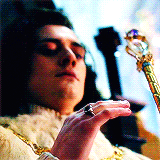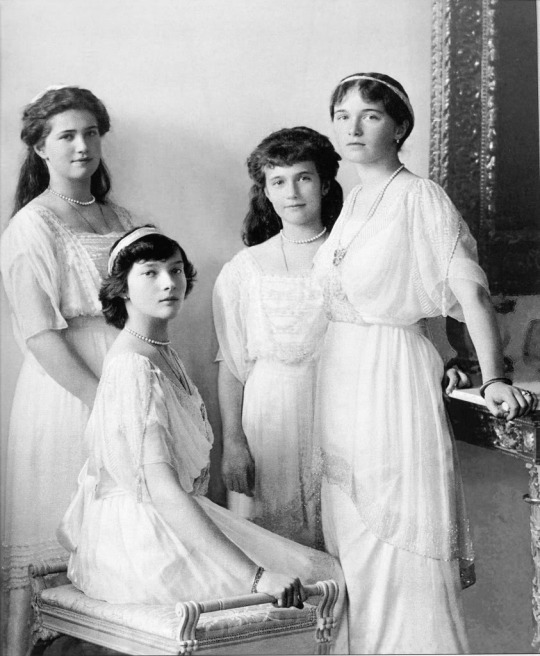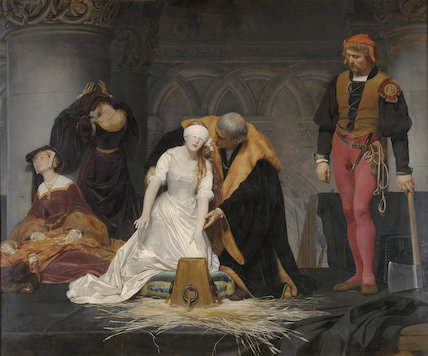#were they poor? was his mother suffering from an illness? was his father a shithead? tell us gege
Text
Court Archetypes: The Pretender

There are always those who want the throne. They carve it, they need the power it gives... or else somebody behind them wants them to do it. Pretenders add a threat to any throne as well as interesting subplots for your WIP.
The Successful

These were all pretenders in their times but they won their throne and kept it for a number of years.
Stephen I of England: Henry I had one son and a daughter. His son died in a shipwreck, leaving his daughter, Matilda or Maud to take the throne on his death. During this period, England's empire straddled the Channel. Matilda was in France when her father died and pregnant as well. In her absence, her cousin Stephen seized the throne. So ensued a bloody war for the throne which Matilda was winning at one point, entering her coronation but was chased away by Londoners. Matilda gave up the war on the terms that her son Henry would become King when Stephen died, which he did.
Richard III: I like Richard. He suffered from scoliosis, remained loyal to his brother and had a fairytale-like elopement with his wife. In 1483, Richard's brother died leaving a twelve year old heir. Richard had agreed to act as Regent but after putting off the prince's coronation for months, arresting the boys maternal uncle and half brother, executing his dead brother's best friend and imprisoning his brother in the tower with him, Richard seized the throne. There is murkiness about whether Richard had the boys killed. The boys did vanish but whether it was Richard or another power, we can never know for certain. Personally, I think Richard was acting in protection for the realm which would have been endanger from civil unrest, the commons resented the Queen's family and there were other pretenders. Richard was a tested battle commander and the strongest hope to keep the country stable. I think he had good intentions if he went the wrong way about it.
Edward IV: Edward was the son of another pretender, Richard of York. When Richard of York died at the hands of Margaret of Anjou along with his young son Edmund, Edward took up the mantle of kingship and ousted the House of Lancaster from the throne, installing the House of York.
The Exiles

Some royals were thrown out of their homeland by either a coup or another pretender. Sometimes they're the hero, other times they are not.
Charles Edward Stuart ("Bonnie Prince Charlie): I have mixed feelings about this man. He doesn't deserve the grand legend attached to him nor the kindness history gilds him with. He was a drunken fool who led thousands to their death like his shithead father. But his claim is just. The only reason barring him from his throne is his religion. His story should have been a fairytale, the prince riding to reclaim his family throne. But he died a poor beggar, drinking and lamenting past glories.
Charles II: Charles II was exiled from England along with his mother and younger siblings after the monarchy was overthrown. Charles was technically a pretender while Oliver "Dickbreath" Cromwell ruled England. He shot his shot when Cromwell died and restored the monarchy.
Henry VII: Henry had no chance at throne. Born of a legitimized bastard line and a Welsh line, Henry was not the first person people thought of when considering heirs to the throne. During the mess of the Wars of the Roses, he got closer and closer to the throne which meant he was a threat to the Yorkist line. He escaped to Brittany and then to France, where he waited for his chance. His mother helped orchestrate his two invasions of England, his second being successful at Bosworth Field.
The False

Some Pretenders are not pretenders at all. Some Pretenders are charlatans or mad men or perhaps greedy fools. Some are even almost successful
Perkin Warbeck (Richard Plantagenet/ Richard IV?): Perkin Warbeck, the son of a Tournai boatman, invaded England in 1495 under the guise of Prince Richard Plantagenet, Prince no. 2 in the Tower. He went to Scotland to garner support, winning a wife from the Scottish King. He rode south toward London, the country divided in opinion over his legitimacy. Was he the lost Prince of York? Real or not, Warbeck was defeated. Henry VII chose to be merciful offering Warbeck a place a court which he accepted. But the plots kept swirling about the mysterious pretender. In order to secure an alliance with Spain, Henry was finally forced to kill the pretender. Was he really Prince Richard? Some historians say no, some say yes. As for me, I am open to the theory that he is but I rather liked to think that if Prince Richard did survive the Tower, that he found safety somewhere far away and forgot all about crowns and thrones. Of course, that's just wishful thinking....
Anna Andersen (Anastasia Romanov): In 1918, the Russian Tsar, Tsarina, Tsarevitch and four Grand Duchesses were executed by rebels. Once that terrible murder happened, rumours began to spread that one daughter had escaped when they were burying the bodies, helped away by a young scared soldier. The rumours allowed pretenders to come forward pretending to be the youngest daughter, Anastasia. The remaining Russian royals met with several promising ones but they all cons. In Germany in the 1920s, a young woman began claiming to be the Grand Duchess. A few members of the royal family met her and believed her along with her childhood friend, Gleb Botkin. There was some evidence, her signature was the same, she knew somethings about the Grand Duchess's childhood and had similar birth marks. By the time DNA testing came about, Anderson was dead. They tested her remains and it was clear that she was a pretender. I don't like Andersen but I think that she did believe in the lie, she was emotionally disturbed person with a history of mental illness.
Yemelyan Pugachev (Peter III of Russia): Pugachev was a Cossack who led a rebellion against Catherine the Great. He convinced a great number of Russian serfs that he was the dickweed Peter III, who had died months after his wife Catherine kicked him off the throne. She may or may not have known about the assassination plot against his life. Catherine's armies obliterated the rebellion and Pugachev was beheaded, drawn and quartered.
The Puppet

Some Pretenders are just innocents who troublemakers gather about in order to gain power. The puppet pretender is always a sympathetic figure in literature.
Edward Plantagenet, Earl of Warwick: Edward was a simple-minded child whose great misfortune it was to be born into the House of York. The son of the Duke of Clarence, the brother to two of England's kings, he was named heir to the throne by his uncle Richard III when his own son died. Edward was imprisoned in the Tower when Henry VII came to power. But though Edward was likely incapable of ruling, Yorkist rebels kept rebelling in his name. In 1499, he was executed at the behest of the Anglo-Spanish treaty. He was a harmless man killed for a throne he likely didn't even realise was his by right. It is probably the one of the only events of history that I hate.
Lambert Simnel: Lambert Simnel was a pretender to the throne during the reign of Henry VII. He was a schoolboy who was placed at the head of a Yorkist rebellion for the resemblance between he and the Princes in the Tower. He was put forward as the Earl of Warwick, who people believed had escaped the Tower. When the rebellion was quashed, Henry VII was merciful and had the boy placed in the kitchens as a spit boy. Years later, he went on to become a royal falconer. Nothing else is known about his life.
Lady Jane Grey, Queen of England: Jane Grey was named Queen by her predecessor and cousin Edward VI. This was mainly due to her being Protestant as Edward VI was a Reformer. Jane had not wanted to be Queen, claiming that it was her Catholic cousin's throne not hers. In the name of faith, she was pressed to proclaim herself queen, in which the heralds had to explain who she was and how she could be queen. People had trouble with the claim for a few reasons: the succession had never included her only the king's two sisters, her mother who she drew her claim through was still alive meaning her mother was ahead of her by rights and nobody knew who she was. Jane's ascension had been a grand plot hatched by the Dukes of Suffolk and Northumberland. Northumberland wed Jane to his own son only months before. But Jane was no shrinking violet. In her nine days, she told her husband that he would never be king only a duke, she wrote her declarations signing herself as queen and ordered Northumberland to head her armies in place of her father. When Mary I ousted her from the throne, Jane was glad to give up the throne but not her Protestant faith. After failed rebellions to put Jane back in power, Mary I had no choice but to have her executed.
#court archetypes#Pretenders#Richard iii#stephen I#Anastasia romanov#lambert simnel#lady Jane Grey#writing advice writing resources#writer problems#writing resources writing reference#writing reference#writing resources#writing advice#fantasy#fantasy nobility#fantasy guide#writing guide#characters#fantasy characters#fantasy courts#history dump#archetypes#fantasy archetypes
743 notes
·
View notes